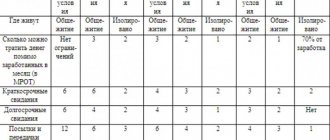How to find out which prison a person is serving his sentence in?
I want to find my father, I haven’t seen him for 13 years. Where can I get information about which prison my father is serving his sentence in?
In accordance with Art. 17 of the Criminal Executive Code of the Russian Federation (hereinafter referred to as the Penal Code of the Russian Federation), about the arrival of a convicted person at the place of serving his sentence, the administration of the institution or body executing punishment is obliged, no later than 10 days from the date of arrival, to send a notification to one of the relatives of the convicted person of his choice. A similar obligation is provided for in Art. 75 of the Penal Code of the Russian Federation, ordering the administration of the pre-trial detention center to notify one of the relatives of the convict’s choice about where he is going to serve his sentence.
Article 81 of the Penal Code of the Russian Federation states that those sentenced to imprisonment must serve the entire term of their sentence, as a rule, in one correctional institution or pre-trial detention center, including if they are assigned a new sentence while serving imprisonment, unless the court does not The type of correctional facility has been changed. This provision also provides that in the event of a convict being transferred to another correctional institution, the administration of the correctional institution to which the convict was transferred shall immediately notify the victim or his legal representative. Thus, notification of the relatives of the convicted person about the place where he will serve his sentence is carried out once.
To obtain information, contact the FSIN office in your region with an application to provide information about the place where the prisoner is serving his sentence, indicating all the information you know about him (full name, date and place of birth, passport details, case number, etc.). Documents confirming the degree of relationship must be attached to the application.
Source
How is the transportation?
The prison phase can last several months and most of the time the convict will simply wait for his turn. This is due to the fact that the Federal Penitentiary Service is trying to staff the trains as much as possible, since no one will organize a stage for the sake of one or two criminals.
Have a question for a lawyer? Ask now, call and get a free consultation from leading lawyers in your city. We will answer your questions quickly and try to help with your specific case.
Telephone in Moscow and the Moscow region: +7
Phone in St. Petersburg and Leningrad region: +7
Free hotline throughout Russia: 8
Transportation of convicts is carried out in transport specially equipped for this purpose - they are delivered to the train in cars with enhanced security. The train cars are also equipped in a similar way.
Searches at the stage are carried out quite often. The convicted person does not always immediately end up in his penitentiary institution. Sometimes it is a transit prison, from where those already serving their sentences are distributed to colonies.
At the final destination, the convict is sent to quarantine - it is equal to two weeks. Within 10 days after the convict arrives at the place of serving his sentence, relatives are required to inform about his whereabouts - this is the responsibility of the management of the correctional institution.
If for some reason the relatives were not provided with information about the whereabouts of the convicted person, they can find out this from the lawyer or investigator who led the case. Also about how you can find a convicted person, knowing his full name.
Why is information not available?
According to Article 17 of the Penal Code of the Russian Federation, the administration of the penal institution must notify the arrival of one of the prisoner’s relatives at the place of serving the sentence within 10 days. The pre-trial detention center, in turn, notifies the relative about where the convicted person is sent after the court verdict (Article 75 of the Penal Code of the Russian Federation).
Consequently, according to the law, relatives of a prisoner are informed of his whereabouts when transferred to a colony or prison from a pre-trial detention center. If a person who is already serving a sentence is sent to another correctional facility, no notification is provided.
Article 81 of the Penal Code of the Russian Federation obliges to notify only the victim or his legal representative if the convicted person’s file contains a copy of the relevant ruling or resolution.
During a long transfer, there is no way for a long time to contact loved ones and report your whereabouts. Subsequently, the convicted person also cannot always immediately get in touch with relatives. Even in the case of transfer from a pre-trial detention center, notification may not be received due to the fact that the prisoner himself refused to give contact information to any of his relatives.
What it is?
Conveyance is the forced transportation of a convicted person from point A to point B. Often this means transportation from a pre-trial detention center to a penitentiary institution, where the convicted person will serve his sentence. However, staging can also be used in the following cases:
- To be brought to court from a pre-trial detention center.
- Bringing to court a person who has already been convicted and is serving a sentence if a new criminal case has been filed against him for consideration;
- Delivery to the court for review of the case, addition of sentences, if another case has been received, for review of the case;
- To change the place of serving a sentence - from one type of colony to another, or to another region.
The choice of the transfer location is not accidental - where to send the convict is decided by the management of the pre-trial detention center, based on the chosen measure of restraint.
Before the management of the pre-trial detention center chooses the place where the convict will be sent, a kind of order comes from the Federal Penitentiary Service, which indicates in which penitentiary institution or region there are places for convicts.
Due to the fact that some colonies are located in remote places of the Russian Federation, transportation can last more than one week or even a month. Therefore, the convicted person himself needs to prepare for such a “journey.”
Search for a convicted person by name online
In the Russian Federation, there are specialized services for searching for the stay of a prisoner, but their work is illegal, so there is simply no point in paying for their intermediary services in searching for information.
Queries will help you search for documents from the public domain on the Internet that will contain the information you are interested in. You need cassation appeals, court verdicts and other papers. They can contain information that will be useful for contacting the police, court and other authorities. This is a time-consuming, but working method.
On the websites of some correctional institutions you can clarify the stay of a prisoner (of course, with his permission). The amount of information in the public domain is minimal, but there is a chance to find basic information by name and date of birth.
Usually the search immediately produces results, but they may not be due to the same Federal Law “On the detention of accused persons, suspects in custody,” which was already mentioned earlier. Updates on colony websites are made within 1-7 days, so it makes sense to review the database from time to time. The optimal interval is daily.
How can a convicted person prepare for transfer?
The terms of the transfer of prisoners, including the date of departure, are not communicated to the convicted person, so it makes sense to start preparing after the court’s verdict. The following recommendations should be taken into account:
Search through the police
Another way to find out where a convicted person was sent from a pre-trial detention center is to contact the police department. This option is only available to lawyers and close relatives of the prisoner.
The following documents and information must be provided:
Using this information, government officials will generate a request and send it to the internal information database.
Correctional facilities
The method is suitable for those relatives of the convicted person who know about the region where their loved one is located. The pre-trial detention center and colony to which the convicted person is transferred, in most cases, are located in the same region where the arrest took place.
A list of colonies and pre-trial detention centers is being compiled, and requests are sent there. Ways to contact the administration of a colony or other correctional institution:
- submitting a personal request;
- electronic appeal;
- phone number;
- ordered letter.
The layer's services
If you are unable to find a convicted relative on your own, you can seek legal help. Specialists know about the peculiarities of document preparation, rights, and obligations of the parties.
There are free lawyers, but they usually provide an appropriate level of service; seeking such help involves a significant waiting time.
Lawyers who provide services on a paid basis are more interested in achieving the required results. They will offer different ways to solve current problems, and the client will choose the best one for himself from the options presented.
Source
Search options: how to find out where a convicted person is serving his sentence?
Find a person through the Russian Federal Prison Administration
Let's be clear right away - as such, there is no Federal Prison Administration in the Russian Federation . There is the FSIN of the Russian Federation - the Federal Penitentiary Service of the Russian Federation. This is, in a way, the center of everything related to criminal legislation in the Russian Federation. Pre-trial detention centers, colonies, the Criminal Code of the Russian Federation, responsibility and punishment - everything is from this story.
The words “Find a person through the Federal Administration of Prisons of Russia” do not mean a search through some kind of system or large catalog where everything is laid out for you on the shelves. We wrote above that there are no such databases. And a search through the FSIN is when you simply call all the colonies in the desired district and find out whether the prisoner is there or not, whether he has been transferred there or not. Start your search in the area where the court decision was made. If you don’t find it, you’ll have to contact the others, and there are about 1000 of them.
There is a high probability of obtaining information when submitting a request or appeal to the main department of the Federal Penitentiary Service of the Russian Federation (GU FSIN). However, even there, information will be provided only to close relatives (who have confirmed their relationship) or at the request of a lawyer. Everyone else should not expect data. Therefore, the only option is to either wait or contact correctional institutions (having previously found their contacts).
Using the directory of correctional institutions
The easiest way to start your search is with a directory of prisons and colonies (how is a prison different from a colony?). The most popular of them is https://fsin-atlas.ru, but you can use other similar resources. From there you can go to the official website of the specific place of detention.
When you get to the official website, you can use the information in the “Contacts” section of the official website of the colony (or, if you get to the official page of the Federal Penitentiary Service, there are also contacts of the desired correctional institution). After a colony has been found, you can contact its leadership and find out whether a particular person is among those serving a sentence.
Also, practically no website has updated lists of prisoners that can be checked by searching online. However, according to legal theorists, if the relatives of the convicted person have not received information about where he was sent after the trial, they have the right to submit requests and complaints both to the administration of the pre-trial detention center or colonies, and to the prosecutor of the district in whose territory the trial took place.
Search engine Yandex, Google
Another option would be the most banal:
It is important to remember the following:
Many hope that information from the so-called “darknet” will be more accurate than the official one. Alas, even sites with the “.onion” address extension, accessible only through the anonymous TOR network, rarely post this kind of information for free.
Contacting the police
Sometimes, in order to find a convicted person, it is recommended to file a missing person report with the police. How does this method work?
To summarize, we can say: you can contact the police. But it is not a fact that the information will be provided.
Who escorts the convicts?
The support is provided by a whole group of FSIN employees, which consists of the following officials:
- Chief of the convoy.
- Assistant chief of the convoy.
- Several guards (depending on the number of prisoners).
- Dog handlers with dogs.
The number of escorts and dog handlers will depend on the number of convicts, as well as the severity of their crime.
A reinforced convoy group means 3 escorts per criminal. This form is used if a particularly dangerous convict is being transferred.
The procedure for preparing for the stage and staging must comply with the instructions:
- Before boarding the transport, the convict is thoroughly searched in a specially designated room. Information about it is entered into a special journal.
- There must always be radio communication between the guards who are at the loading area of convicts into transport and those who conduct a search before loading.
- If the purpose of transportation is to be brought to court, then there must be a special permit for this: it indicates the date the person was sent, the place where he should be delivered, the case number and name of the judge who is considering it, the signature and seal of the person in charge.
For security reasons, the convoy must always be armed.
The procedure for transferring to the place of serving the sentence is lengthy, the transportation itself takes place in difficult conditions, since the convicts do not have basic living conditions: take a shower, clean up and eat.






